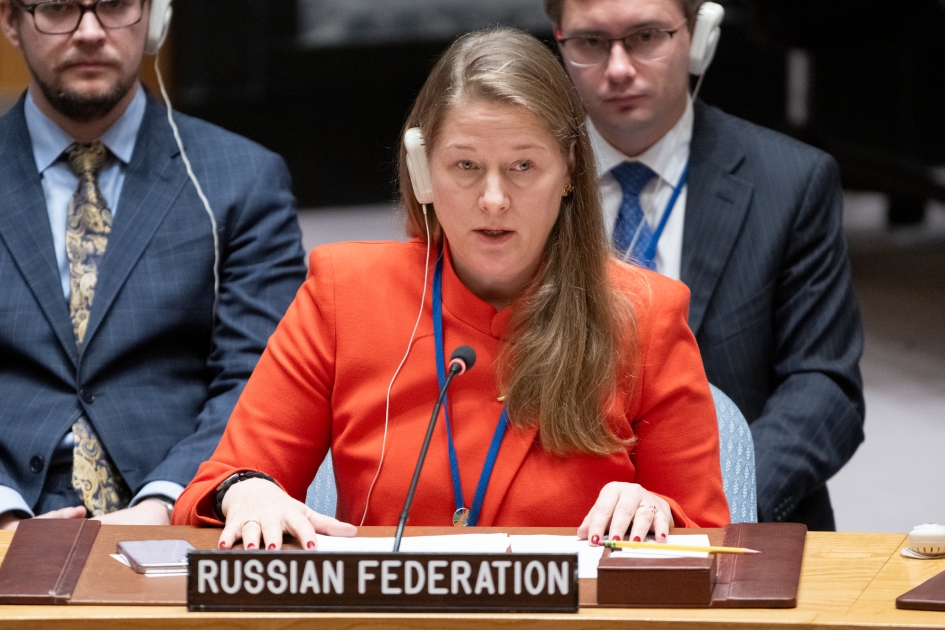Statement by Deputy Permanent Representative Maria Zabolotskaya at UNSC meeting on the report of the Investigative Team to Promote Accountability for Crimes Committed by Daesh/ISIL in Iraq
Mr.President,
The Russian Federation attaches great importance to issues of countering terrorism and holding terrorists accountable for their crimes. This is an integral part of our common efforts to fight the terrorist threat. In this context, we carefully monitor the activities of the Investigative Team to Promote Accountability for Crimes Committed by Daesh/ISIL (UNITAD) in Iraq.
We note efforts that UNITAD has made in the recent reporting period to add to the evidence of Daesh/ISIL crimes at all tracks of the investigation, including crimes against ethnic communes, killings in Tikrit and Sinjar, the destruction of cultural property, and issues relating to ISIL’s financial recharge.
It is gratifying that, at least in the seventh year of its work, UNTAD has finally shared with the Iraqi authorities some of the material it has collected on the production and use of chemical weapons by terrorists, as well as on sexual violence. It is less than 10 months until UNITAD will have to terminate its work. We are surprised that, against that backdrop, only a tiny part of what the Team has managed to accumulate has been handed over to Iraq so far. In fact, it is not entirely clear why this evidence was not being transferred to Iraq on a permanent basis. Why have we reached this point only now? A legitimate question arises. Why and for whom was this evidence collected in the first place, if the Iraqi justice cannot have it? We continue hearing that, thanks to the assistance of UNITAD, individuals are held to account in third (mainly Western) countries. But those separate overseas trials, were they the core mandate of UNITAD?
As prescribed by the Security Council, UNITAD’s main task is to offer assistance first and foremost to Iraq so that the country can prosecute ISIL fighters. Reluctance to hand over the collected evidence to Baghdad has resulted in thousands of terrorists escaping the punishment they deserve.
As we can see, much of the credit for this unenviable state of affairs goes to the predecessor of the current Special Adviser. During C.Ritscher's tenure there has been some movement towards fulfilling the main mandate of the Investigation Team – something that was simply ignored by K. Khan who kept simulating intense activity for years. As we understand it, Iraq has received nothing from UNITAD during that period. There is a question that we want to ask now, in the Security Council. How many trials have taken place in Iraq against terrorists on the basis of the evidence that UNITAD had collected? Has there been any such trial? Well, we did not expect anything else from Mr.Karim Khan, a British national. In his new office, he continues to do the same thing - "prioritizing and de-prioritizing" investigations to accommodate the whims of his Western patrons.
If the Investigation Team, from the very beginning of its activities, had faithfully fulfilled the mandate entrusted to it to support the national efforts of Iraqi law enforcement and judicial authorities by providing them with full evidence, the Iraqi judicial system would have already completed the process of bringing terrorists to justice. Seven years is a very long time. May I recall that the Nuremberg trials took only a year and a half.
We demand that all materials accumulated by the Investigation Team (including in digital form) and corresponding analytical reports be handed over to the Iraqi authorities without delay or preconditions, as stipulated in SC resolution 2379 (2017), and reaffirmed in resolution 2697 (2023).
We recall that, at the request of the Government of Iraq, the Security Council in its resolution 2697 (2023) extended the mandate of UNITAD for one year only, until 17 September 2024. That underscores the need to make the most effective use of the remaining time. We trust that UNITAD will intensify its cooperation with Baghdad. We draw attention to the fact that allegations of imperfect legislation cannot and should not be used as a pretext for failing to comply with the Security Council's instructions. We were dismayed to hear that UNITAD is not going to be able to complete its work before its mandate expires. But it is our understanding that the Team must comply with the Council's directives.
We welcome the news that, pursuant to paragraph 5 of Security Council resolution 2697 (2023), it was possible to agree expeditiously with the Iraqi authorities on the modalities for the transfer of evidence to third countries. We trust that this step will allow to guarantee compliance with the requirement to obtain Baghdad's approval for such transfers.
This being said, we believe that the report does not provide sufficient information on the implementation of the remaining paragraphs of the resolution. It lets out almost completely the most important issue about the drawdown of UNITAD's activities. We expect those shortcomings to be fully corrected in the January report of the Secretary-General and the Special Adviser's roadmap that is due in March.
We expect these documents to provide a detailed account of specific measures that have been or will be taken in the remaining 10 months to expedite the transfer of evidence to Iraqis and the winding down of UNITAD's activities. Particular attention should be paid to elaborating this drawdown process in a step-by-step manner.
In conclusion, we should like to emphasize that UNITAD now has the last opportunity to fulfil the main part of its mandate by finally handing over all the evidence to the Iraqi authorities. Without that, its mission can hardly be considered a success.
Thank you.
